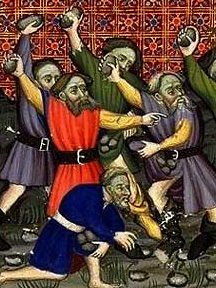
1st Century Palestine |
Casting Stones
Casting Aspersions
Casting Couches
|

21st Century Palestine |
Stephen intercede for the red martyrs, white martyrs, and pseudo-martyrs.
Stephen intercede for the parish which bears your name.

1st Century Palestine |
Casting Stones
Casting Aspersions
Casting Couches
|

21st Century Palestine |
Stephen intercede for the red martyrs, white martyrs, and pseudo-martyrs.
Stephen intercede for the parish which bears your name.
Our world abounds with anti-concepts. They manufacture opinion; they manufacture consent. They are rhetorical smoke and mirrors calling out pay no attention to the man behind the curtain. Find them. Uproot them.

a triptych
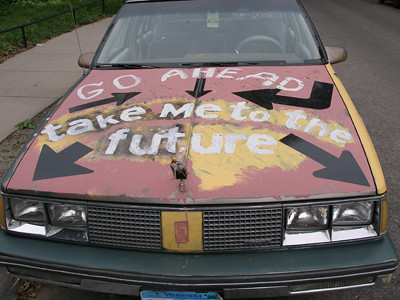

oh, and the roof was a chess board with magnetic pieces.

art car: n. a drivable vehicle that has been adorned, painted and/or modified to express some sort of artistic expression. These are usually cars that are covered with anything from beads and mirrors to toys and doll parts, but are only limited by the creator's imagination. See also mutant vehicle.
just: adv.
1. only, simply
2. flag word, that often indicates that was follows is not only or simply as stated
3. a rhetorical marker that deceives or conditions the listener as well as the speaker as to the simplicity of its object
gender: n.
|
A couple of yesterdays ago, gender was a linguistic category for nouns, while sex was the biological categories of male and female. Yesterday, gender meant the subjective social/cultural constructs of what it means to be male or female and the associated roles, whereas sex was the objective biological categories of male and female. Today, it seems that gender has come to mean whether someone is male or female, natal or reconstructed, and sex is solely a physical activity. Tomorrow >>>>>>>>>>>>>>>>> |
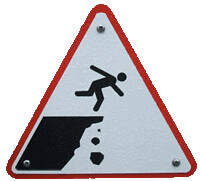
|






Although he didn't use the term manufacturing consent, Orwell coined Newspeak, the underlying premise of which is that if something can't be said, then it can't be thought. This suits ideologues, especially those who are either reactionary or progressive or totalitarian alike, and whose aim is to make any alternative thinking or speech impossible by removing any words or possible constructs which describe the prohibited concept.
In Politics and the English Language Orwell lamented the quality of the English of the time (1946), citing examples of dying metaphors, pretentious diction or rhetoric, and meaningless words, all of which contribute to fuzzy ideas and a lack of logical thinking.
Was Orwell a prophet or was 1984 a how to manual? Redefining and eliminating words redefines and eliminates thought. This is the goal of political correctness. Eliminated and redefined thought eliminates and redefines culture, society, institutions, and indeed man itself. Words, thoughts, consent, culture, and man all become manufactured.
 |
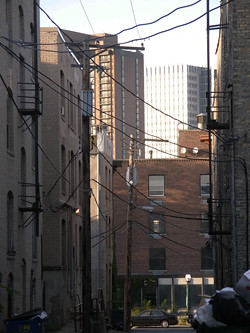 |
 |
Lippmann observed that people make up their minds before they define the facts, while the ideal would be to gather and analyze the facts before reaching conclusions. This in conjunction with an increasingly technological, complex, and interdependent world, points out that the primary defect of democracy is the impossible ideal of the "omnicompetent citizen".
He also maintained that mass media is an ineffective method of genuinely educating the public. The first reason is the ineffectiveness of journalists and the second reason is that "the mass of the reading public is not interested in learning and assimilating the results of accurate investigation."
For Lippmann, the news and truth need not be synonymous, as the “function of news is to signalize an event, the function of truth is to bring to light the hidden facts, to set them in relation with each other, and make a picture of reality on which men can act.” The news, therefore, is “imperfectly recorded” and too fragile to bear the charge as “an organ of direct democracy.”
So the substitute of genuinely educating the public is for journalist to engage in “intelligence work” and transmit information from an elite class of technocrats to the public for the purpose of forming their opinions. The voting citizen then in turn chooses the policies that they been manufactured into consenting to, thus closing the loop.
The phrase Manufacturing Consent comes from Public Opinion, 1922.
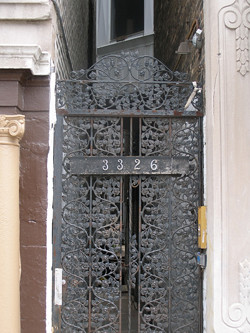 |
 |
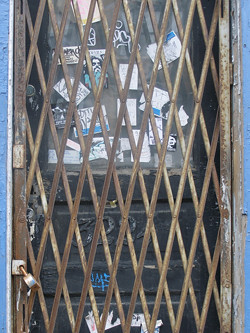 |
Many students, especially those who are poor, intuitively know what the schools do for them. They school them to confuse process and substance. Once these become blurred, a new logic is assumed: the more treatment there is, the better are the results; or, escalation leads to success. The pupil is thereby "schooled" to confuse teaching with learning, grade advancement with education, a diploma with competence, and fluency with the ability to say something new. His imagination is "schooled" to accept service in place of value. Medical treatment is mistaken for health care, social work for the improvement of community life, police protection for safety, military poise for national security, the rat race for productive work. Health, learning, dignity, independence, and creative endeavor are defined as little more than the performance of the institutions which claim to serve these ends, and their improvement is made to depend on allocating more resources to the management of hospitals, schools, and other agencies in question.Deschooling Society — Ivan Illich
1. The first article of a bill of rights for a modern and humanist society corresponds to the first amendment of the United States Constitution. The state shall make no law with respect to an establishment of education. There shall be no graded curriculum, obligatory for all.2. To make this disestablishment effective, we need a law forbidding discrimination in hiring, voting, or admission to centers of learning based on previous attendance at some curriculum. This guarantee would not exclude specific tests of competence, but would remove the present absurd discrimination in favor of the person who learns a given skill with the largest expenditure of public funds.
3. A third legal reform would guarantee the right of each citizen to an equal share of public educational resources, the right to verify his share of these resources, and the right to sue for them if they are denied. A generalized GI bill, or an edu-credit card in the hand of every citizen, would effectively implement this third guarantee.
4. A fourth guarantee to protect the consumer against the monopoly of the educational market would be analogous to antitrust laws.
A Constitution for Cultural Revolution — Ivan Illich
The political revolutionary wants to improve existing institutions - their productivity and the quality and distribution of their products. His vision of what is desirable and possible is based on consumption habits developed during the last hundred years. The cultural revolutionary believes that these habits have radically distorted our view of what human beings can have and want. He questions the reality that others take for granted, a reality that, in his view, is the artificial by-product of contemporary institutions, created and reinforced by them in pursuit of their short-term ends.A Constitution for Cultural Revolution — Ivan Illich
Don't oppose the revolution; gain control of it and redirect its ends.
or
Why the rules of this game require that we all become Gramscians.
Procedural conservatism: the generally pragmatic principle of avoiding the upsetting of existing status quo regardless of the status quo's substance; conservatism of form.
or as G.K. Chesterton said, The whole modern world has divided itself into conservatives and progressives. The business of progressives is to go on making mistakes. The business of conservatives is to prevent the mistakes from being corrected.
Revolutionary conservatism: the conservatism of function, content, or substance, which is fully and proactively engaged in the culture and its institutions.

|
because it is not enough or how I learned to stop worrying ...this much |
du·op·o·ly
n. an economic or political condition in which power is concentrated in two persons or groups
he·ge·mo·ny
n. the social, cultural, ideological, or economic influence exerted by a dominant group
ol·i·gar·chy
n. a government in which a small group exercises control especially for corrupt and selfish purposes; also : a group exercising such control
New York Images An photo archive of prominent New York buildings.
Forgotten New York The hidden, forgotten, and imperiled: ads, alleys, cemeteries, cobblestones, neighborhoods, signs, subways & trains, trolleys, you'd never believe you're in NYC, forgotten tours, and more.
Curbed In New York City, it all comes back to real estate, rent, and the neighborhoods we inhabit.
Bridge and Tunnel Club Photos and more photos.
NYC Roads Maps, history, and design of NYC parkways and freeways.
2nd Ave. Sagas Transit news, history, and NYC links.
New York Daily Photo New York City - a place of diversity. Visit a daily photo blog of the timely, the timeless, the classic, the unexpected and the hidden gems by a long time resident who shares his love of New York.
Brooklyn College of the City University of New York Department of Sociology, Sociology of Brooklyn Page
Manhattan Neighborhood Map So that's where Hell's Kitchen is.
Queens Neighborhood Map Don't know Bayside form Howard Beach? This map will help.
the Moon doesn't diminish the Sun
the Moon reflects the Light of the Sun
the Mother doesn't diminish the Son
the Mother reflects the Light of the Son
Who said what:
|
1. If we fail to anticipate the unforeseen or expect the unexpected in a universe of infinite possibilities, we may find ourselves at the mercy of anyone or anything that cannot be programmed, categorized or easily referenced. 2. It is an act of faith to assert that our thoughts have any relation to reality at all. 3. Some people are born mediocre, some people achieve mediocrity, and some people have mediocrity thrust upon them. 4. Any country that accepts abortion, is not teaching its people to love, but to use any violence to get what it wants. 5. There are two mistakes people usually make when it comes to the devil: one is not to believe in him at all; the other is to believe in him too much. 6. History will be kind to me, for I intend to write it. 7. Diane, 10:03 am, Great Northern Hotel. Sheriff Truman and I have just been with the one-armed man or what's left of him. In another time, another culture he may have been a seer, a shaolin priest. In our world he's a shoe salesman and lives among the shadows. |
A. G.K. Chesterton B. Fox Mulder C. Joseph Heller D. Dale Cooper E. C.S. Lewis F. Winston Churchill G. Mother Theresa |
no, no, no, not Ivan Ilyich...
...but Ivan Illich
His fundamental argument, widely admired in some quarters and ridiculed and caricatured in others, was that once our institutions developed beyond a certain scale, they became perverse, counterproductive to the beneficial ends for which they were originally conceived. The end result of this paradoxical counter-productivity was schools which make people dumb, complacent and unquestioning; hospitals which produce disease; prisons which make people violent; travel at high speed which creates traffic jams; and ‘aid and development’ agencies which create more and more ‘needy’ and ‘underconsuming’ people.
If there’s a social ill, people tend to clamor to have a new law, program, or structure added to our already micromanaged society.
If there’s a physical ill, people tend to seek to have a new drug, supplement, or regimen added their already reeling bodies.
If there’s a psychological or spiritual ill, people tend to seek to uncover a new technique, attitude, or habit to add to their already full egos.
And this is called progress. But what if...
...instead, we sought out for subtraction any maladaptive or excessive law, program, or structure?
...instead, we sought out for subtraction any maladaptive or excessive drug, supplement, or regimen?
...instead, we sought out for subtraction any maladaptive or excessive technique, attitude, or habit?
Evolution through counterrevolution.
Less is more.
I must decrease that He might increase.
distinctly formed and colored cloud
sailing with indistinct companions
I'm aware of its existence
and saddened knowing of its impermanence


and the trains weren't moving
the wind is strong...going places
the birds of the air...going places
the cars whizzing left and right...going places
the cyclists all over...going places
the pedestrians briskly or leisurely...going places
everything going places...but to where?
busy, busy, going...but to where?
where are you going?
Patrolman: Do you know how fast you're going?
Heisenberg: No, but I can tell you exactly where I am.
where are you?
Camus rightly argues that to commit to a just cause against overwhelming odds is absurd. He further argues that not to commit is equally absurd. Only one choice, however, offers the slightest chance for dignity. And dignity matters.
Totoleration = when toleration takes on totalitarian qualities
Let's not forget that UFOs are unidentified flying objects, or to put it differently (and entirely the same) objects (phenomena), that fly (or are in or come through the sky), and that are unidentified (we don't know what they are).
For if you comprehend, He is not God. Be there a pious confession of ignorance, rather than a rash profession of knowledge. To reach to God in any measure by the mind, is a great blessedness, but to comprehend Him is altogether impossible. — Augustine, Sermo LXVII
That is why the Zen Masters say: "If you meet the Buddha, kill him." Here we must be very circumspect. The "Holy Object" must be destroyed in so far as it is an idol embodying the secret desires, aspirations and powers of the ego-self. — Thomas Merton